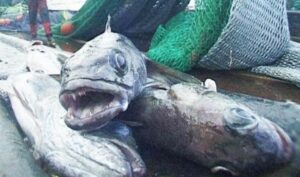
Last month, two U.S. Representatives from Orlando sent a letter to U.S. Secretary of State Antony Blinken and U.S. Secretary of Commerce Gina Raimondo calling on the administration to defend the rights of U.S. fish processors and sellers who are currently locked out of the critical South Georgia Patagonian Toothfish Fishery, an irreplaceable source for Patagonian Toothfish, otherwise known as Chilean Seabass.
Rep. Val Demings led the letter with Rhode Island Rep. David Cicilline, and Rep. Darren Soto joined the effort by signing on to the letter.
“Florida fish processers, sellers, restaurants, and grocery stores have been locked out of a $100 million market due to diplomatic gamesmanship by Russia,” said Rep. Demings. “Livelihoods are on the line. It is critical that the administration along with our allies around the world reject Russia’s cynical and dishonest efforts to hurt hardworking American businesses and U.S. consumers. The South Georgia fishery is among the most sustainable in the world. It is well-managed and environmentally responsible. We call on the administration to work with our allies and ensure continued access by American businesses to this important source of good jobs and sustainable food.”
“The Administration must act quickly to stop Russian efforts to lock Americans out of a $100 million market by blocking the sustainable management of the South Georgia fishery,” said Rep. Cicilline. “The seafood industry plays a critical role in Rhode Island’s economy with imports from the South Georgia fishery supporting restaurants, grocery stores, fish processers, and sellers across the state. Maintaining access to this critical fishery will protect American jobs and counter Russia’s repeated attempts to undermine international institutions.”
Letter Text
Dear Secretary Blinken and Secretary Raimondo:
We write to share our concerns regarding recent efforts by Russia to disrupt the international fishing regime. At a time when Russia is at the brink of war with Ukraine, its obstruction of the Commission on the Conservation of Antarctic Marine Living Resources (CCAMLR) is another example of Russia’s consistent disregard for the rule of law.
The United States is a founding member and active participant in the CCAMLR, the 26-member international body governing conservation and fishing in the Antarctic. The State Department and Commerce Department have joint responsibility to implement the U.S.’s obligations under CCAMLR and U.S. implementing law. CCAMLR operates by consensus and the parties are required to establish conservation measures and fishing limits based on the “best available scientific information.” The CCAMLR Scientific Committee includes representatives from every CCAMLR member state. The U.S. is represented on the Scientific Committee by the National Oceanic and Atmospheric Administration (NOAA).
Historically, the CCAMLR Scientific Committee has operated effectively, reflecting the highest scientific standards and integrity. It represents international cooperation and collaboration at its best, managing sensitive Antarctic ecosystems sustainably. The Scientific Committee’s conservation and catch limit recommendations have routinely been adopted by CCAMLR, resulting in the recovery and sustainable management of important fish stocks across the Antarctic, particularly the Patagonian Toothfish (commercially known as Chilean Seabass).
The United Kingdom’s South Georgia Island toothfish fishery, technically CCAMLR Statistical Subarea 48.3, exemplifies CCAMLR’s success. Before CCAMLR, the South Georgia fishery was subject to rampant illegal, unreported, and unregulated (IUU) fishing (mostly by the then-Soviet fishing fleet). Under CCAMLR, the U.K. has implemented CCAMLR conservation measures (including licensing, monitoring, documentation, catch limits, and compliance measures) that have made the South Georgia toothfish fishery the most sustainable in the world. In 2004, it became the first toothfish fishery certified as sustainable by the Marine Stewardship Council (MSC). Under strict U.K. management and enforcement, IUU fishing in Subarea 48.3 have been eliminated (since 2006).
A significant portion of U.S. imports of MSC-certified Chilean Seabass originate from the U.K.’s South Georgia fishery. The U.S. imports approximately 3 million pounds of MSC-certified toothfish from South Georgia every year, worth approximately $50 million to importers as part of an approximately $100 million consumer market. These imports provide high-quality American jobs, in our states and across the country, including in shipping and storage, processing, retail, and restaurants across the nation.
But these jobs are at risk due to unilateral and cynical efforts by Russia to undercut the science based CCAMLR system. In October 2021, Russia took the unprecedented step of blocking the CCAMLR Scientific Committee’s toothfish catch limit recommendation for the South Georgia fishery. Russia’s position was unanimously condemned by every member of CCAMLR that addressed the issue, including the U.S., U.K., Australia, New Zealand, France, Norway, Korea, and the European Union. The U.S. Representative stated on the record: “The USA does not believe there is a scientific basis to close the toothfish fishery in Subarea 48.3. We continue to support the adoption of [the catch limits recommended by the Scientific Committee].”
Unfortunately, NOAA, which administers U.S. regulations implementing CCAMLR, has indicated to U.S. companies that it may be forced to prohibit toothfish imports from the South Georgia fishery in 2022 due to Russia’s actions. There is no substitute for those imports. An import moratorium would be devastating for U.S. companies and workers who rely on toothfish imports from the South Georgia fishery, it would increase prices for other fish imports and adversely impact restaurants, and it would undermine the integrity of the CCAMLR process. The U.K. and U.S. importers disagree with NOAA’s preliminary legal analysis, and make a compelling case that U.S. law, CCAMLR, and customary international law permit the U.K. to continue legally operating the South Georgia toothfish fishery, which would permit continued U.S. imports in 2022.
We strongly urge you to work with our U.K. allies and U.S. businesses to ensure continued imports of sustainable Chilean Seabass from the South Georgia fishery in 2022, preserving high-quality jobs in our states and upholding the purpose and spirit of CCAMLR.


